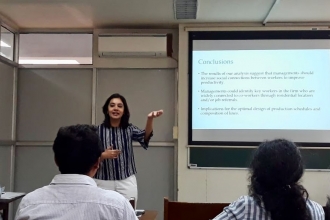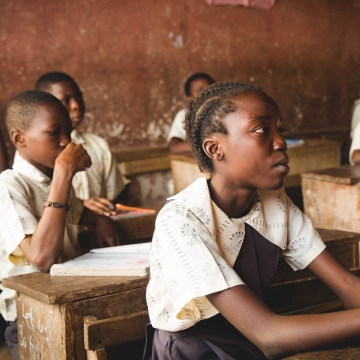
Women in the Economy Workshop 2020
Workshop Summary : As the world adjusts to the new reality brought on by the Covid-19 pandemic, the workspaces of the future may look very different from what they are today. How would these changes…

Women in the Economy Workshop 2019
Organized by ISI with the support of IWWAGE The annual workshop to study the role of women in the economy was conducted by ISI in collaboration with the The Initiative for What Works to Advance Women…
Why are fewer married women joining the work force in rural India? A decomposition analysis over two decades
In contrast with global trends, India has witnessed a secular decline in women’s employment rates over the past few decades. We investigate this decline in rural areas, where the majority of Indian women reside. Using parametric and semi-parametric decomposition techniques, we show that changes in individual and household attributes fully account for the fall in women’s labor force participation in 1987–1999 and account for more than half of the decline in 1999–2011.
Editorial Introduction to Special Issue on “Gender, Family and Development”
This special issue on gender comprises articles from four different country settings: Sierra Leone, Senegal, Bangladesh, and Albania. Each uses large secondary data sets to explore how changing market and institutional environments affect gender attitudes and outcomes. In spite of the many historical and contemporary differences in these four economies, we see common difficulties in achieving gender equality.
Redistributing teachers using local transfers
In this paper we show that local redistribution of educational resources via teacher transfers between neighboring public schools can improve equity in access to teachers. Transfers from teacher surplus schools to deficit schools within a 10 km radius in Haryana, a state of India for which we have geo-coded location of schools in 2013, enables 19 percent of deficit schools to meet the minimum requirement. We use the mandated norms in the Right to Education Act in India, to define deficit and surplus schools.
Gender Differences in Health Expenditure of Rural Cancer Patients: Evidence from a Public Tertiary Care Facility in India
This paper investigates if there are gender differences in health expenditures and treatment seeking behavior among cancer patients and finds that the results are consistent with gender discrimination. Using a survey on rural patients suffering from cancer in a public tertiary health center in an Indian state Odisha, the study finds that expenditures on female patients are significantly lesser than those on males. Even after controlling for other covariates, in particular the type of cancer, demographic and socio-economic variables, 73% of the difference persists.
Unmasking the mystery of the varying benefits from electrification
The project, titled, "Unmasking the mystery of the varying benefits from electrification", seeks to contribute to the energy debate by focusing on the impacts of recent electrification efforts in
Modelling of Women's Labor Supply Decisions in a Life Cycle Framework
The low rate of female labor force participation (FLFP) in India is puzzling given the rapid fertility transition, increases in women’s educational attainment, and substantial economic growth over the
Female Employment, Soil Endowment, and Agricultural Technology
India’s female labor force participation rate (FLFPR) has remained low over the past decades, despite economic growth and demographic conditions such as fall in fertility and increase in female
Pagination
- Previous page
- Page 25
- Next page

